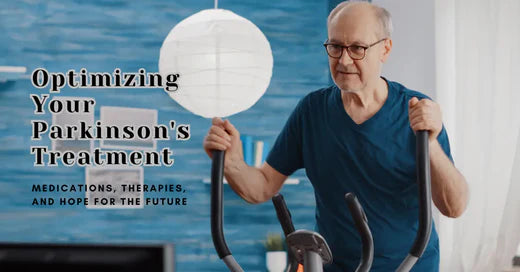
Optimizing Your Parkinson's Treatment: Medications, Therapies, and Hope for the Future
Share
Parkinson's disease is a neurodegenerative disorder that affects millions worldwide. It primarily impacts movement, causing tremors, stiffness, and balance problems. While there's currently no cure, there are various Parkinson's treatment options available to manage symptoms and improve quality of life. This blog post delves into the different approaches to managing Parkinson's, equipping you with information to discuss treatment plans with your doctor.
Table of Contents
- Understanding Parkinson's: The Role of Dopamine
- The Mainstay of Treatment: Medication
- Finding the Right Regimen
- Surgical Intervention: Deep Brain Stimulation (DBS)
- The Power of Non-Medical Therapies
- Complementary and Alternative Therapies
- The Importance of a Support System
- Looking Ahead: Research and Hope
- Living Well with Parkinson's
- Frequently Asked Questions
- 1. What are the different types of Parkinson's treatment?
- 2. How long can you live a normal life with Parkinson’s disease?
- 3. What are some complementary and alternative therapies that can help with Parkinson's?
- 4. What is the role of exercise in Parkinson's treatment?
- 5. Is there a cure for Parkinson's disease?
- 6. How can I find support groups for Parkinson's disease?
Understanding Parkinson's: The Role of Dopamine
Parkinson's arises from the loss of dopamine-producing nerve cells in a specific region of the brain. Dopamine acts as a chemical messenger, coordinating movement signals. The decline in dopamine levels disrupts these signals, leading to the characteristic symptoms of Parkinson's disease. However, there are some tested Parkinson’s treatment options that can provide relief.
The Mainstay of Treatment: Medication
Medications form the cornerstone of Parkinson's treatment. Here's a breakdown of some commonly used drugs:
- Levodopa: The most effective medication, levodopa is converted to dopamine in the brain, replenishing the depleted stores and improving movement. It's often combined with carbidopa, which prevents levodopa breakdown before reaching the brain, minimising side effects like nausea.
- Dopamine Agonists: These medications mimic dopamine's effects by stimulating dopamine receptors in the brain. They're often used in the early stages of Parkinson's or in combination with levodopa. Examples include pramipexole and ropinirole.
- MAO-B Inhibitors: These medications slow the breakdown of dopamine in the brain, allowing it to function for a longer duration. Selegiline and rasagiline are examples of MAO-B inhibitors.
- COMT Inhibitors: These medications work by inhibiting an enzyme that breaks down levodopa, allowing it to stay active for a longer period. Entacapone is a commonly used COMT inhibitor.
Finding the Right Regimen
The specific medications and dosages prescribed will depend on individual factors like:
- Age and overall health
- Severity and progression of symptoms
- Response to different medications
- Presence of side effects
It's crucial to work closely with a neurologist to find the most effective and tolerable medication regimen.
Surgical Intervention: Deep Brain Stimulation (DBS)
For some people with advanced Parkinson's whose symptoms become unresponsive to medication, Deep Brain Stimulation (DBS) can be an option. DBS involves implanting electrodes in specific areas of the brain that control movement. These electrodes deliver mild electrical pulses, regulating nerve activity and improving symptoms like tremors and rigidity.

The Power of Non-Medical Therapies
While medication plays a vital role, Parkinson's treatment extends beyond pills. Here are some non-medical approaches that can significantly enhance well-being:
- Physical Therapy: A customised physical therapy programme can help maintain flexibility, strength, and balance, improving mobility and reducing the risk of falls.
- Occupational Therapy: Occupational therapists can help individuals with Parkinson's adapt daily activities to accommodate their limitations, promoting independence.
- Speech Therapy: Speech problems are common in Parkinson's. Speech therapists can provide strategies to improve speech clarity and volume.
- Exercise: Regular exercise is vital for managing Parkinson's symptoms. Activities like walking, swimming, and cycling can improve movement, coordination, and overall well-being.
- Diet and Nutrition: Maintaining a healthy diet rich in fruits, vegetables, and whole grains can provide essential nutrients and support overall health.
Complementary and Alternative Therapies
Some people with Parkinson's find relief through complementary and alternative therapies, although their effectiveness varies and requires research. These can include:
- Massage Therapy: Massage can promote relaxation, reduce muscle tension, and improve pain.
- Yoga and Tai Chi: These mind-body practices can enhance flexibility, balance, and coordination.
- Acupuncture: While studies are ongoing, acupuncture may offer some relief from tremors and pain.
The Importance of a Support System
Living with Parkinson's can be challenging, and having a strong support system is crucial. This could include family members, friends, support groups, or a therapist. Sharing experiences, challenges, and successes with a supportive network can provide emotional strength and improve overall well-being.

Looking Ahead: Research and Hope
Parkinson's research is constantly evolving, exploring new treatment options. Some promising areas include:
- Gene Therapy: Research is underway to explore gene therapy approaches that could potentially replace lost dopamine-producing cells.
- Stem Cell Therapy: Studies are investigating the potential of stem cells to regenerate dopamine-producing cells in the brain.
- Environmental Factors: Research is ongoing to understand how environmental factors might contribute to Parkinson's and identify potential preventive strategies.
Living Well with Parkinson's
Parkinson's may present challenges, but with proper treatment, a healthy lifestyle, and a supportive network, individuals with Parkinson's can live fulfilling and manage all Parkinson’s treatment. While there is currently no cure, ongoing research and advancements in medical science continue to offer hope for better management and potential future therapies. By raising awareness and fostering a supportive community, we can improve the quality of life for those affected by Parkinson's disease and move closer to finding a cure.
Frequently Asked Questions
1. What are the different types of Parkinson's treatment?
Parkinson's treatment involves a multi-pronged approach, including medications, surgery (Deep Brain Stimulation), and non-medical therapies. Medications like levodopa, carbidopa, dopamine agonists, MAO-B inhibitors, and COMT inhibitors aim to increase dopamine levels or mimic its effects in the brain. Physical therapy, occupational therapy, speech therapy, exercise, and a healthy diet are crucial non-medical therapies that can significantly improve symptoms and quality of life.
2. How long can you live a normal life with Parkinson’s disease?
Parkinson’s doesn’t dramatically affect an individual’s lifestyle. Parkinson's is a progressive disease, meaning symptoms gradually worsen over time. However, the rate of progression varies significantly between individuals.
3. What are some complementary and alternative therapies that can help with Parkinson's?
While not a mainstream treatment, some people with Parkinson's find relief through complementary and alternative therapies like massage therapy, yoga, tai chi, and acupuncture. It's important to note that the effectiveness of these therapies varies and may require further research.
4. What is the role of exercise in Parkinson's treatment?
Regular exercise is a vital component of Parkinson's treatment. Activities like walking, swimming, and cycling can improve movement, coordination, and overall well-being by promoting flexibility, strength, and balance.
5. Is there a cure for Parkinson's disease?
Currently, there is no cure for Parkinson's disease. However, Parkinson's treatment can significantly manage symptoms and improve quality of life. Research is ongoing to explore potential curative options like gene therapy, stem cell therapy,and identifying preventive measures to reduce environmental risk factors.
6. How can I find support groups for Parkinson's disease?
Having a strong support system is crucial for managing Parkinson's. Talking to family members, friends, therapists, or joining support groups can provide emotional strength, share experiences, and improve overall well-being. You can search online for Parkinson's support groups in your area or connect with organizations for more information.
